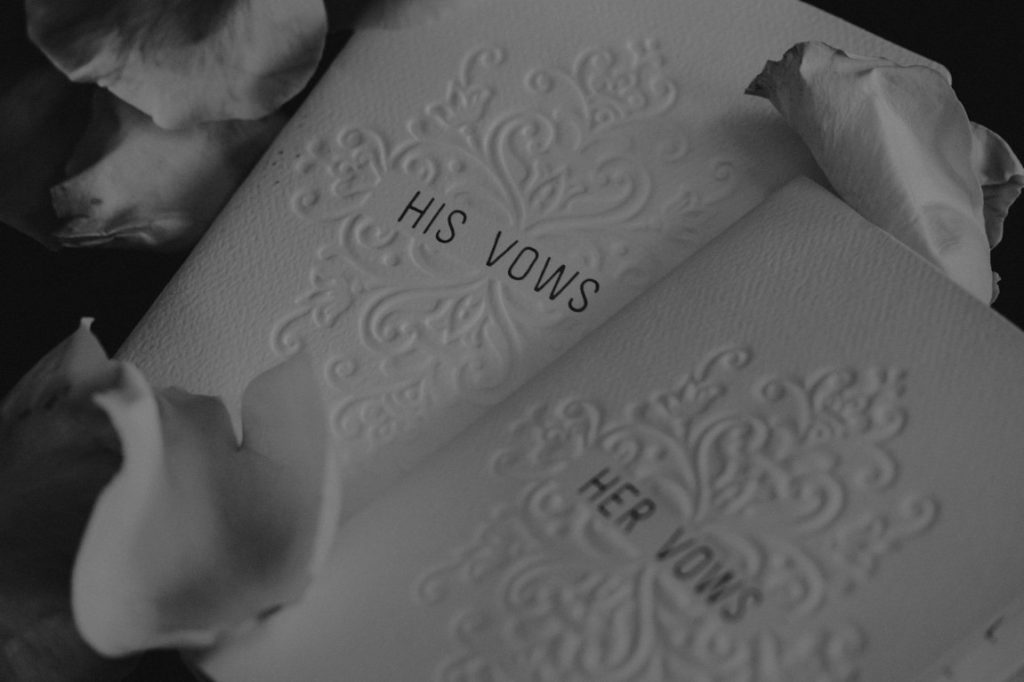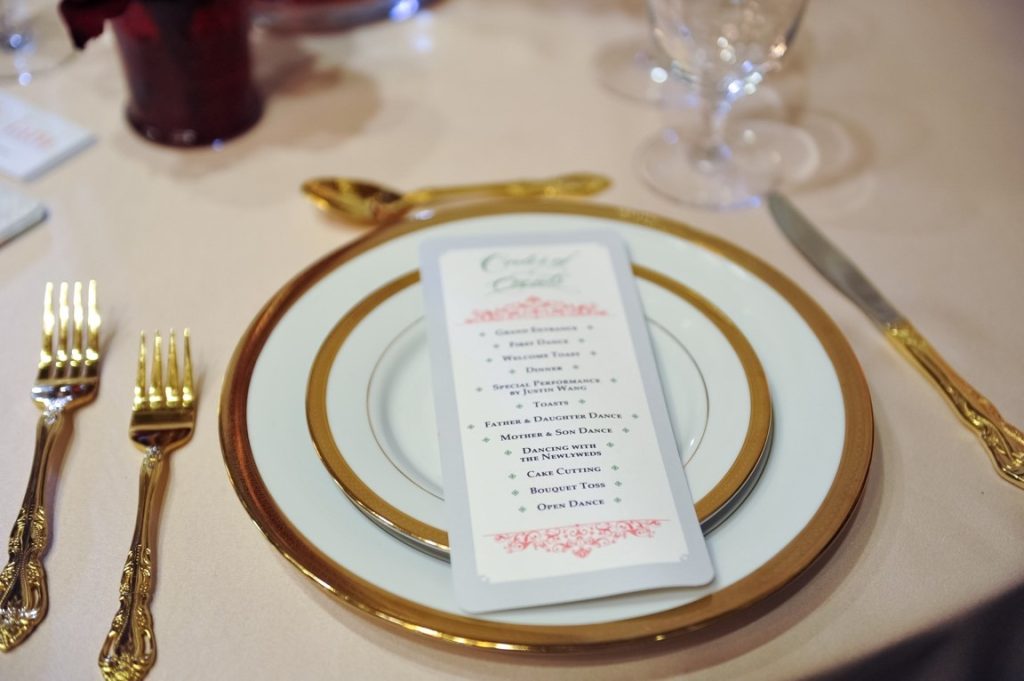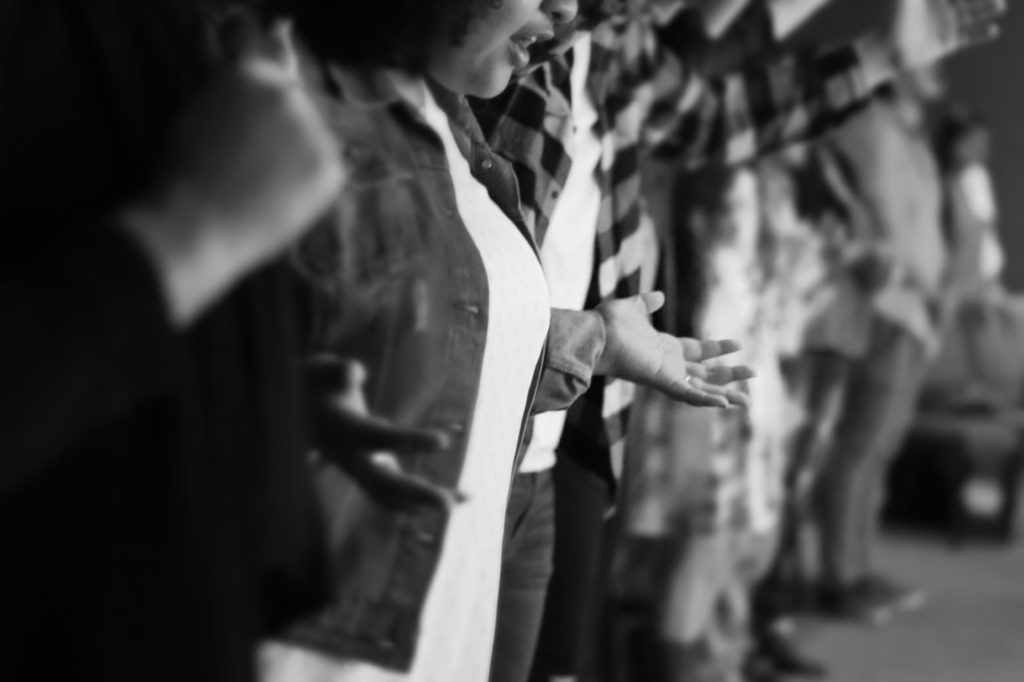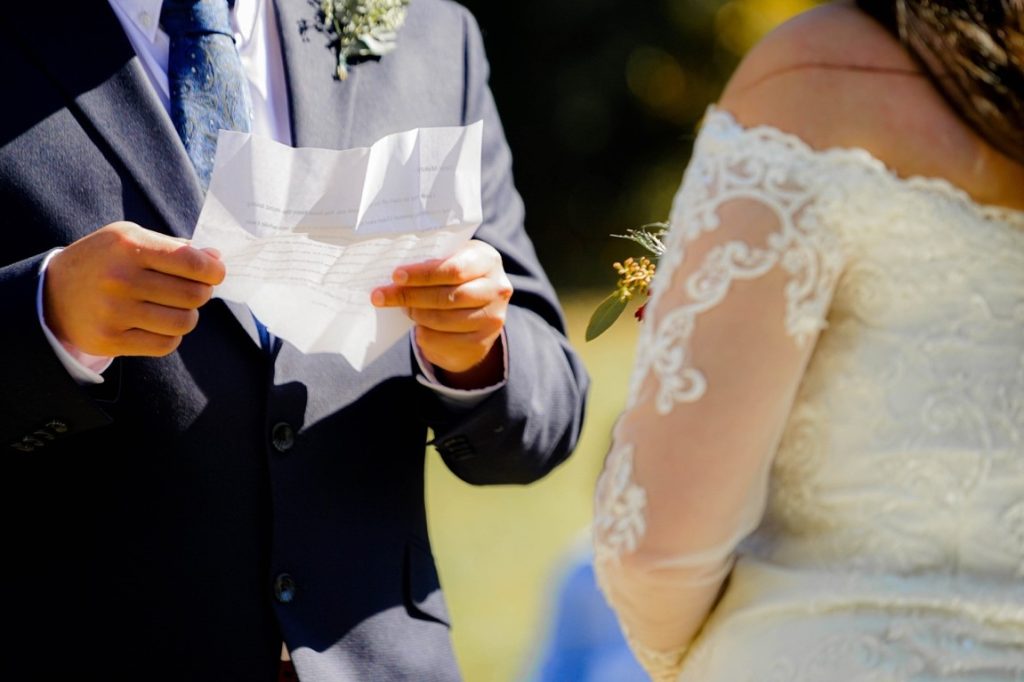It is difficult to pinpoint memorable parts of a wedding simply because there are so many. However, the most sentimental part is arguably the exchange of vows; the couple makes their promises, affirms their commitment, and looks forward to the rest of their lives together.
If you will be having a religious ceremony, you might be wondering, “can we write our own vows for a Catholic wedding?” Unfortunately, you cannot. Having uniform vows symbolizes the Church’s unity and the sacredness of the Sacrament of Matrimony.
Below are five intriguing facts you should know about Catholic wedding vows and why couples cannot personalize them. Afterward, alternative ways to express your emotions during the ceremony are explored.
Catholic Wedding Vows: Interesting Facts
1. There are two versions of Catholic wedding vows. Couples are free to choose which one they want to use.
Even though you cannot write your own vows for a Catholic wedding, you can at least choose from the two versions from The Order of Celebrating Matrimony. Here is the standard version:
“Officiant: Since it is your intention to enter the covenant of Holy Matrimony, join your right hands and declare your consent before God and his Church.
Groom: I, [groom’s name], take you, [bride’s name], to be my wife. I promise to be faithful to you in good times and in bad, in sickness and in health, to love you and to honor you all the days of my life.
Bride: I, [bride’s name], take you, [groom’s name], to be my husband. I promise to be faithful to you in good times and in bad, in sickness and in health, to love you and to honor you all the days of my life.”
The other version has slightly different wording:
Groom: I, [groom’s name], take you, [bride’s name], for my lawful wife, to have and to hold, from this day forward, for better, for worse, for richer, for poorer, in sickness and in health, until death do us part.
Bride: I, [bride’s name], take you, [groom’s name], for my lawful husband, to have and to hold, from this day forward, for better, for worse, for richer, for poorer, in sickness and in health, until death do us part.
2. You can choose to memorize the vows or respond to the officiant with “I do.”

You might feel conflicted about whether to memorize the prescribed vows or respond with “I do.” Both options have pros and cons, which might be good to explore before deciding how to proceed.
Memorizing your vows leading up to the wedding can help ease your anxiety. It is understandable to feel unprepared and intimidated at the thought of marriage and married life. By repeating and internalizing these words, you are reassuring yourself.
Furthermore, when you exchange memorized vows, you will look — and feel — firmer and more heartfelt in your decision. While you and your partner know to yourself that you are 100% sure, your guests will see that conviction with memorized vows.
However, the downfall of memorizing anything is you risk forgetting something. When you are already feeling a lot of emotions, you might end up mixing words or phrases. You might even be too teary or overwhelmed to speak clearly.
You can trust your officiant to assist you if this situation happens. For instance, they might ask you to repeat the words after them.
However, you can also simply let your officiant take the reins. Doing so will allow you to focus entirely on your partner and the moment. Here is what that would look like:
Officiant: [Groom’s name], do you take [bride’s name] to be your wife? Do you promise to be faithful to her in good times and in bad, in sickness and in health, to love her and to honor her all the days of your life?
Groom: I do.
Officiant: [Bride’s name], do you take [groom’s name] to be your husband? Do you promise to be faithful to him in good times and in bad, in sickness and in health, to love him and to honor him all the days of your life?
Bride: I do.
3. One reason the Church prohibits personalized wedding vows is to preserve unity among all believers.
The Catechism of the Catholic Church stresses that the Church is one. One “visible bond of communion” within the Church is the unity of the liturgy; that is to say, using the same verbiage in the celebration of Sacraments.
Furthermore, by using the prescribed vows, the couple recognizes that they belong to a community. Specifically, they acknowledge that their faith will be a primary part of not only their identities but also their relationship.
4. The Church provides the wedding vows so the words can match the sacrament’s sacredness.

While you write vows, your personality probably shines through in your words. Your vows might be witty, romantic, dramatic, poetic, or whatnot. Your personal beliefs, like spiritualism, may also find their way into your vows.
However, the Church worries that you might unintentionally make the validity of your marriage debatable. For one, some vows do not explicitly state their mutual consent to marry. Mutual consent is the driving force of the Sacrament of Matrimony.
Moreover, your words might seem as if they are “limiting the marriage” by adding rules or conditions. If your vows are interpreted in that way, your union might be questionable in the eyes of the Church. You can refer to the Code of Canon Law for further clarification on this matter.
5. Some priests might let you change the wording slightly, but the vows will mostly remain true to what the Church prescribes.
Most priests and bishops will not let you personalize your wedding vows. Traditional and conservative members of the Church will gladly explain why you need to use the authorized vows.
In some cases, your priest may be more modern and open to changes. They might permit some changes in the wording, such as replacing terms and perhaps even using gender-neutral language.
However, you might have difficulties finding such priests; they are few and far between.
What to Do If You Want Your Own Vows: Alternatives

Exchange Vows at the Reception
Speeches are one of the most memorable parts of any wedding reception. The newlyweds can express their feelings about the day, thank their guests for their presence, and show their gratitude to everyone who made the ceremony possible.
While the answer to the question, “can you write your own vows for a Catholic wedding?” is no, you can prepare some vows and include them in your speech at the reception. Just be mindful of your words, especially if a priest or deacon will attend the party.
If you plan your reception timeline right, the moment will be magical and romantic. For example, after making a speech as newlyweds, you can proceed directly to your first dance as a married couple.
Write a Personal Statement in Your Wedding Program

Wedding programs are guides given to guests, letting them know pertinent information like how the day will proceed, who the bridal party members are, directions to the reception venue, and more.
If you cannot exchange personalized vows at the ceremony, you can include them instead in your wedding program. When your guests read your personal statement, they can understand how committed and dedicated you are to each other.
Additionally, you can tell your guests the story of how you and your partner met. If you have a special song, Bible verse, or poem, you can also have it printed on the program.
However, you may have to let your officiant read the statements to check if they are suitable for printing.
Choose Music with Personal Significance

While you may not have control over your vows, you can decide what music to play at your Catholic wedding. You can choose a song that has a special meaning to you and your partner. In a way, this choice will express your feelings for each other.
There is no list of pre-approved wedding music. However, remember that your priest or parish has the right to reject your song choice. They use three criteria to decide what is appropriate for a holy celebration:
- Prayerfulness. Does the music put everyone in the mood to worship, pray, and thank God? Priests and parishes reject many popular wedding songs on this ground.
- Accessibility. Can your guests sing along to the music effortlessly? The words must be easy to understand and repeat. This criterion emphasizes the importance of unity in the Church.
- Beauty. This criterion is the most subjective. Is the song pleasing? Will listening to the song give you joy, comfort, and whatnot? In many cases, the beauty of a piece depends on the musicians playing it.
If you choose this alternative, you must work closely with the parish. They may have rules surrounding wedding music, such as only working with the local music ministry. Beyond that, they can help you find suitable and sentimental songs, along with what part of the wedding to play them.
Select Which Readings Speak to You
During a Catholic wedding ceremony within Mass, there will be at least three readings from the Scripture: Old Testament, New Testament, and Gospel. Overall, these readings emphasize the importance of marriage in God’s Word and the Church.
You have nine options for the reading from the Old Testament, 13 from the New Testament, and 10 from the Gospel. Each reading has a unique context and theme.
Browse the options with your partner, and let your officiant know which readings you connect with the most.
